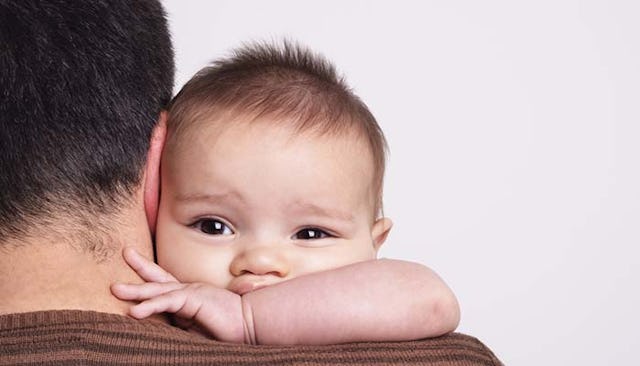Dads Get Postpartum Depression, Too

Report finds postpartum depression is almost as common in dads as it is in moms
According to a a new report from the University of Massachusetts’ Journal of Parent and Family Mental Health that shines some light on postpartum depression, it turns out it’s not just a mom thing.
From the report: “For both men and women, PPD is defined as moderate to severe depression diagnosed in the postpartum period, which is shortly after or up to one year following delivery. Studies suggest anywhere from 4 to 25 percent of fathers experience paternal PPD, rates that are not dissimilar to mothers. Fathers are most likely to experience a first onset of paternal PPD in the first 3 to 6 months of the postpartum period.”
This may be news, but it doesn’t strike me as particularly shocking. Men may not carry babies, but the impact of having one can be just as taxing. The study states, “Becoming a father is associated with little sleep, new and increasing demands, and new responsibilities that may trigger stress, fear, and anxiety, all of which can lead to depression.” Oh do ya think so, doctor?
Having been through two postpartum periods (I just entered month seven of my second kid’s life), most of the psychological stress I endured actually occurred before my kids were born. Those months were racked with the anxiety of feeling unprepared, fearing the responsibility, worrying about the lack of sleep, wondering if I could hack it, etc. Luckily for me, once my children emerged, I was too overwhelmed with the day-to-day burden of raising them to focus on my fears. I just had to live my life. But that doesn’t mean the stress, fear, and anxiety went away. I’m almost six years deep with my first kid, and as far as I can tell, the stress, fear, and anxiety associated with being a parent never go away, regardless of your chromosomes.
The real danger here is the correlation between male and female PPD, and what that might mean for kids.
“Research suggests that depression in one partner is significantly correlated with depression in the other. One study found 24 to 50 percent of men with paternal PPD also had partners with PPD. This suggests a high likelihood that infants may be in family situations where multiple caregivers are depressed, which can lead to more severe disruptions in infant development.”
The good news is that your depression triggers your spouse’s depression which can then lead to problems for your baby… never mind, there is no good news here. In fact, I feel like just reading that has the potential to trigger depression!
Having a baby isn’t easy, raising a baby isn’t easy, managing a relationship throughout all of that isn’t easy, none of this is easy. And while this kind of news may be disheartening, it’s also a necessary step towards solving these problems, or, at the very least, being aware of them and reacting accordingly.
Because just as it’s important to acknowledge the psychological struggles women often suffer after giving birth, something which the world only slowly seems to be doing, it’s equally crucial that we accept the potential for men to suffer from similar issues.
Especially in a world in which men are discouraged from admitting such a thing.